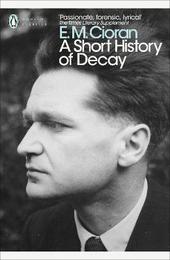
|
A Short History of Decay
Paperback / softback
Main Details
| Title |
A Short History of Decay
|
| Authors and Contributors |
By (author) E. M. Cioran
|
| Series | Penguin Modern Classics |
|---|
| Physical Properties |
| Format:Paperback / softback | | Pages:192 | | Dimensions(mm): Height 198,Width 129 |
|
| Category/Genre | Philosophy - epistemology and theory of knowledge |
|---|
| ISBN/Barcode |
9780241343463
|
| Classifications | Dewey:128 |
|---|
| Audience | |
|---|
|
Publishing Details |
| Publisher |
Penguin Books Ltd
|
| Imprint |
Penguin Classics
|
| Publication Date |
2 August 2018 |
| Publication Country |
United Kingdom
|
Description
Witty and nihilistic essays from one of Central Europe's most remarkable philosophers A Short History of Decay (1949) is E. M. Cioran's nihilistic and witty collection of aphoristic essays concerning the nature of civilization in mid 20th-century Europe. Touching upon man's need to worship, the feebleness of God, the downfall of the Ancient Greeks and the melancholy baseness of all existence, Cioran's pieces are pessimistic in the extreme, but also display a beautiful certainty that renders them delicate, vivid, and memorable. Illuminating and brutally honest, A Short History of Decay dissects man's decadence in a remarkable series of moving and beautiful pieces.
Author Biography
E. M. Cioran (1911-1995) was one of Central Europe's most remarkable philosophers, author of what William Gass called romances on 'alienation, absurdity, boredom, futility, decay, the tyranny of history, the vulgarities of change, awareness as agony, reason as disease'. A Romanian, he lived much of his life in Paris and many of his major works were written in French, including A Short History of Decay, The Trouble with Being Born and Drawn and Quartered.
ReviewsTo miss reading this book would be a deprivation * Los Angeles Times * Sheds remarkable light on the literature, culture and politics of the region...anyone coming fresh to the field will be captivated by the richness, variety, humour and pathos of a classic literature that, through a shared historical experience, transcends national and linguistic boundaries. -- CJ Schuler * Independent on Sunday *
|